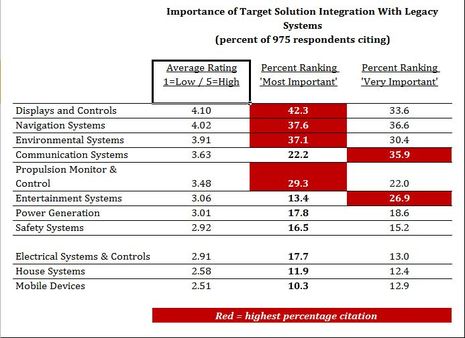MTA: Do new electronics need to play nice with legacy systems?

Marine Technology Advisors is really taking shape. You'll find a new web site at that link, and better yet, the firm tells me that it's getting some attention from marine electronics manufacturers and distributors. The following entry, like the ones in April, is based on last year's survey, specifically where "integration" fit in when marine electronics buyers were asked to rank its importance versus other criteria like pricing, reliability, performance, and feature sets. Nearly 1,000 of you took the survey last year -- which established some good base numbers -- and starting tomorrow the 2011 survey will begin. Please come around whether you filled in the original or want to add your two cents.
Does Integration Matter?
Depends on the system. If you are talking about displays and controls, navigation or environmental sensors and instrumentation, it matters quite a lot. In 2/3 of MTA survey responses, "integration with legacy systems" was cited as the "most important" or "very important" product selection criteria for these solutions.
But switch focus to mobile devices or house systems, and it really does not matter much at all. The average importance rating ascribed to 'integration' for mobile or house systems was 2.51 and 2.58 respectively. That rating is on a 5.0 scale, where 3 is important, and 2 is not very important. In between these two clusters are all the other marine electronics solutions that MTA tracks, including communications, propulsion, entertainment, safety and electrical. Among these systems, the survey response varied widely.
Consider propulsion monitoring and control systems. Nearly 30% or respondents cited as the "most important" product selection criteria, at a 5.0 score. Yet, the average rating was only a 3.48. That means a LOT of people needed to score 'integration' close to a 2.0, or "not very important" to arrive at 3.48 across all respondents.
The point here: Consider the wide range of craft and cruising patterns of the survey respondents. Power and sail. Racing and cruising. Long and short voyage. At the same time, consider the varied rate of integration or replacement for various elements of powertrains, controls and monitoring systems. We are bound to have respondents that view propulsion monitoring and control as a minor issue for any one or many combination of the factors cited.

Take Away: Boats are not homes, or cars
Marine electronics suppliers would do well to apply this insight to their product development plan. Why? Because, if the data is accurate, then it serves as a reference of sorts -- a requirements roadmap -- for marine electronics product managers. This data hints at which devices drivers need to be written, which solutions from sensor and actuator catalogs should be supported, which physical envelopes and mechanical interconnects need to be honored.
These inputs are instructive for intermediaries -- value-added distributors, boatyards, and others -- as it helps these channels define which peripherals and accessories they should be stocking, integrating, and supporting. MTA will survey recreational users again, starting tomorrow, to refresh 2010-2012 budgets and capture 2010 actuals. This year, we will ask respondents for their actual Q1 spend to see if we can learn anything from that data.
Perhaps this kind of analysis will help accelerate the NMEA 2000 infrastructure market? After a year of private discussions with various perspectives in the market, we heard about many inspirations for the libraries of MNEA 2000 compliant solutions. Auto market. Home automation market. Personal electronics market.
But make no mistake, while the industrial automation market provided the baseline protocol for NMEA 2000, and other consumer electronics markets provide reference points; the marine electronics market has unique regulatory, operating environment and application requirements that are real.
Through this survey data, marine users are identifying their specific marine priorities and preferences. And that voice of the customer is precious for marine electronics product development and sales managers.
For you buyer-readers: Continue to be patient, you will be training suppliers for another product generation or two.

 Share
Share
Assuming they are trainable.